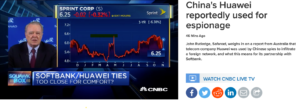CNBC Squawk Box on Huawei
November 5, 2018
I joined Squawk Box anchors on 11/5/18 to discuss Huawei. You can see a short video clip of our discussion by clicking here.
Last week, an Australian newspaper released a story claiming that Chinese telecom giant Huawei had shared passwords with Chinese intelligence agents, allowing them to hack foreign networks. The story is huge for several reasons.
As the largest provider of telecom infrastructure in the world, Huawei plays an important role in China's One Belt One Road initiative to reconstruct the land and sea trade routes that will export soft economic and political influence to more than 60 countries. That makes Huawei a tasty target in the trade war between the US and China.
The US government has banned Huawei products used by government contractors or on military bases. Australia has banned Huawei participation in the rollout of its high-speed, low-latency 5G network.
Huawei has strategic partnerships with major global tech companies both inside (Alibaba, Tencent, Baidu,...) and outside (Google, Intel,...) China
Huawei has close ties with Japan's SoftBank, which puts it right in the middle of SoftBank's proposed sale of Sprint to T-Mobile; 41% of the resulting company would be owned by Germany's Deutsche Telecom.
And all of this is happening during after a rout in the Chinese stock market and the recent meltdown of US tech stocks.
We are going to see a lot more of these stories as the US/China trade war continues to intensify. Of all the topics in economics, international trade and finance are, by far, the most complicated. That may be why I have spent so much time in my chair at CNBC of late, helping the anchors interpret events in the unfolding trade war between the US and, well, everybody else. The topic is so complex and so important, however, that it shouldn't be analyzed one bite at a time. So, I am preparing a monograph on issues in global trade and finance that I will post when available in a few weeks.
Dr. John


